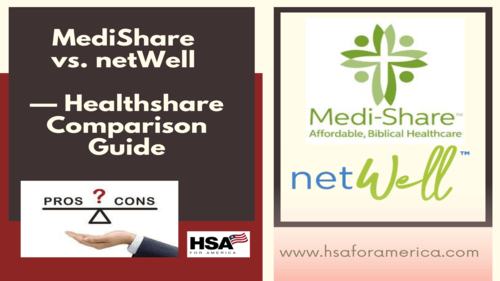We all need healthcare—that’s a fact. However, we deserve to have choices regarding what we pay for and how we obtain the services we need. This article will go over the pros and cons of two healthshare companies that provide an alternative to traditional health insurance plans: MediShare vs. netWell.

MediShare vs. netWell Comparison Guide 2026
Healthshares are a wonderful option for many US consumers looking for an alternative to traditional health insurance. They usually come at low costs and provide access to a greater range of providers, as well as flexibility in the way people choose to receive care. They can also have atypical benefits that regular health insurance doesn’t provide.
Healthshare organizations are independent companies in which members share medical costs among the group. They give people the opportunity to say goodbye to high-cost, complicated insurance carriers who don’t provide much choice in where care comes from or how they’d like their conditions to be treated.
The reason that Health Care Sharing Ministries (HCSMs) can do away with the red tape and expense of regular insurance is that they have greater flexibility to structure their plans. This way, consumers have greater access to provider and service options, lower rates, and more flexibility in how they are cared for.
When choosing a healthshare plan, it’s important to think about some of the things that you would usually weigh when choosing an insurance plan. (Healthsharing is not insurance, and will typically place waiting periods on pre-existing conditions – so they are not for everyone.) Monthly costs, plan details, and pre-existing conditions or unique medical needs should all be given appropriate weight in your decision.
Although healthshares sometimes leave the need for extra coverage, people who use them usually find that, overall, they are paying less each month for medical care than when they were using traditional, unsubsidized health insurance.
Even within healthshares, though, different programs provide various options and benefits. Let’s compare and contrast, exploring the pros and cons of MediShare vs. netWell—two of the most popular healthshares.
MediShare vs. netWell: What Is MediShare
MediShare is one of the most commonly known names in healthsharing. MediShare plan members believe that, in the real-life application of Biblical principles, they should share in one another’s burdens. This includes sharing each other’s eligible medical bills.
Over the past decades, the MediShare plan has discounted and shared over $1.7 billion in medical bills, helping over 250,000 members at any given time.
MediShare comes with plenty of benefits for its plan members, including:
- Accountability – Plan members can vote on guideline changes so that they are never paying for services with which they don’t hold true.
- Affordability – Compared to traditional health insurance, MediShare plans help people save up to 50% on their medical costs—and sometimes even more! There are plans available for every family size and budget, with the average monthly contribution for a family coming in at about $350.
- Biblically Aligned Principles – This program is based on Christian scripture in which people who share their beliefs also share their resources. Medical procedures covered by the plan do not go against values held by plan members.
- Community Connection – This plan includes a component in which members are encouraged to pray for and support each other on their wellness journeys.
- No Tax Penalties – MediShare members are exempt from tax penalties related to the Affordable Care Act. They do not have to carry additional health insurance.
- Year-Round Enrollment – MediShare plans do not require you to wait for an Open Enrollment period; you may join whenever is convenient for you.
There are also other perks to MediShare, such as:
- Discounts on dental, hearing, and vision plans
- Non-emergent access to providers over the phone or on video chat, 24/7 whenever you need it
- Flexibility to choose your own provider or to use one from one of the largest PPO networks in the United States
MediShare Pros and Cons
Just as with any plan, there are pros and cons to MediShare.
MediShare Pros
- As with most healthshares, it is often less expensive than traditional health care plans.
- MediShare is a not-for-profit company, so you don’t have to worry about them hiking up prices for their own benefit like many insurance carriers.
- This plan is faith-based; every member signs a Statement of Faith to ensure that no medical procedures are paid for that go against anyone’s beliefs.
- Health coaches are provided to encourage members to live a healthy lifestyle.
- Video or phone conferencing is provided 24/7 for run-of-the-mill needs, including prescription refills.
- Annual audits provide financial stability.
MediShare Cons
- Bills are only discounted for services rendered within the PHCS network. Some providers, hospitals, or clinics don’t accept MediShare at all.
- Pre-existing conditions can be denied.
You can also read our blog post: Does Medi-Share Cover Emergency Room Visits?
Remember that this plan is not insurance, meaning that there is less state and/or federal protection for members.
MediShare vs. netWell: What Is the netWell Plan?
The netWell plan provides healthsharing to people who need options and customization in their healthcare. Members who do not desire a strict religious component to their healthsharing plan often choose netWell.
Members of netWell plans enjoy access to benefits such as:
- 24/7 access to telemedicine appointments for non-emergent situations
- Preventive screening benefits that help plan for the future
There are three different plans available, all of which come with pros and cons. Let’s compare and contrast the three choices you have for a netWell plan: netWell Advantage, netWell Superior, and netWell Elite.
netWell Advantage
This plan is structured for people who want to have a plan in place for unexpected healthcare costs. For example, no one plans to get in a car accident or need urgent hospitalization but those things do happen.
This basic level does provide access to 24/7 telemedicine care; however, it doesn’t include preventive screening or primary care visits like the upper-level plans do.
netWell Superior
This level of netWell provision is a mix of preventive and primary care. People choose this option if they need a budget-friendly monthly contribution and if they utilize primary care services regularly to stay on track with their health.
ER and hospital visits are not shared, nor is surgery.
netWell Elite
Those who choose netWell Elite reap the benefits of an all-inclusive plan, although they do have to pay more to receive the comprehensive allowances of Elite. The Elite plan shares for doctor visits, preventive care, and hospitalization and surgery. This plan also includes an option for shared maternity care, which is difficult to find in healthshare plan offerings.
There is a high annual sharing limit ($1 million) so people who need many costs covered usually choose this level. There is also a low Member Commitment Portion, sometimes as low as $2,500.
netWell Pros and Cons
There are various reasons why one would select netWell as their healthshare plan; however, there are a couple situations in which netWell wouldn’t be the best choice.
NetWell Pros
- NetWell provides three levels of plans so that you only have to pay for what you need.
- There is an option for preventative screening.
- Telemedicine is available for non-emergent situations.
NetWell Cons
- netWell is not a one-stop shop; all benefits are not included in all levels of plans.
- Since netWell does not require members to vote on the procedures for which they will share costs, members might end up helping others pay for services that do not align with their own beliefs.
Compare Pricing on the Best HealthShare Plans Available
MediShare vs. netWell: FAQs (View Story)
If you’re looking for a quick answer to some of the most common questions, this should help you.
What is a healthshare plan?
Healthshare plans are not insurance; however, many people use them as an alternative choice to paying for services such as emergency room visits or unexpected medical bills. Members share costs among the group.
Are healthshare plans legal?
Yes! Healthsharing plans and HCSMs (healthcare sharing ministries) are a legal way to pay for your medical bills. They provide an alternative, affordable way to pay for expenses without having to pay for high-premium plans that you don’t need.
Do all healthshare plans require signing of a religious ‘Statement of Belief’?
Not all healthshare plans require members to sign a religious Statement of Belief/Faith. Those that do range along a spectrum, with some programs abiding by lightly held principles and others requiring adherence to a strict belief system. However, all healthshare programs do require members to follow particular community and health-based guidelines.
What about vision, dental, and hearing bills?
Although healthsharing plans don’t traditionally share expenses for vision, dental, and hearing, members can take advantage of significant savings programs that still make these services much more affordable.
Do I need to wait until a certain time of the year to sign up?
Healthshare plans do not have Open Enrollment periods, so you can sign up whenever is convenient for you!
Conclusion
It’s important to remember that healthshares are not health insurance. You have to make sure that the services you need will be provided as benefits of your healthsharing plan. Be aware that if you choose a plan that does not share for emergency room visits, you will be responsible for those charges.
MediShare is a great option for many consumers; however, netWell often provides a better overall value for some groups of beneficiaries who don’t desire the religious component to their plan. It can be overwhelming to compare and contrast healthshare plans and weigh the pros and cons. We hope this helped!
Click here to schedule a time to speak with one of our Personal Benefits Managers. We’re here to assist you in navigating through the information and choosing not only the best healthsharing company but the best overall plan for your and your family’s medical and financial needs.
You can also read more about MediShare plans and newWell plans.



